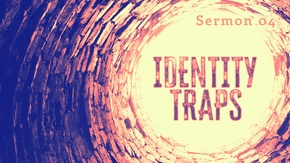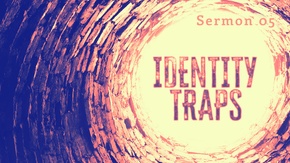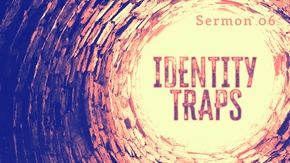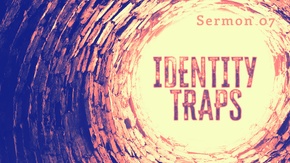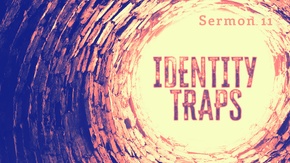Well, welcome back to Identity Traps. We’re in this new series where we’re looking at nine ways we lose ourselves and how Jesus makes us whole. We’re talking about identity. We all have a sense of identity, a sense of self, who we are, what makes us unique, how we fit into life. And it turns out that the most meaningful kinds of identity always provide three fundamental needs for who we are. We need to have significance. We need to know that we matter. We need security. We need to feel safe, that we belong. We need satisfaction, a sense of fulfillment in life. And God made each and every one of us to find our deep identity needs for security, significance, and satisfaction in Him. That’s who we were created for, to find significance as His beloved children, to find security through His loving protection and loyalty, to find satisfaction in His good pleasure. But because of humanity’s sin, and our own sin, we find ourselves estranged from God, and instead of being able to find these deep needs met in God, we turn to other things. And we look for security, significance, and satisfaction in people or power or possessions. And basically what we’re doing is we’re turning from the Creator to the creation. We’re looking to everything other than God to find our deep identities met. We’re living like orphans.
And then Jesus comes. He came on a rescue mission for humanity. He comes. He lives a perfect life in our place. He draws deeply on His identity as the beloved Son of God. He goes to the cross to bear all of our sin and all of our shame, and all of our broken identities, and rises again to offer us a whole new identity in Him, an identity as a son or daughter of God so that by grace through faith in Christ we can have a new identity in Him, children of God. But that identity as a child of God isn’t something we just automatically step in to. No, it takes effort, it takes work. We are to “put on the new man” as Paul says. We are to “work out” the salvation that God is working in us, as Paul says. We are to walk by the Spirit who is reminding us who we are so that we can increasingly act like ourselves.
Friends, following Jesus basically comes down to this: learning to live out our new identity in Christ. That’s what following Jesus is all about. But it’s difficult, isn’t it?
Because we have habits, heart habits; we have learned over time to live like orphans. We have lived so long in that way that this new identity as a child of God takes some intentionality. It takes some practice. We have to unlearn our orphan-hearted habits and embrace the new resources that are available to us in Jesus in the Gospel and live like a child.
So in this series, what we are doing is we are walking through nine different identity traps. There are three core needs met with three different strategies, and we’re looking at nine different Bible characters, each who took a certain identity strategy, and then learned to live as children of God. And our prayer is that as we look at each one of these lives, that we will resonate with one or two of these stories and say, “Wow, that’s me. That’s how I am shaped. That’s how I am bent.” And then watching their transformation hopefully it will help us understand how we can step into the transformation that the Holy Spirit wants to do in our lives by the power of the Gospel. Make sense? That’s our plan.
Now today we’re going to look at our first identity trap. We’re going to look at Joseph’s identity trap, which is seeking significance through people, seeking significance through people.
Joseph was the great-grandson of Abraham in the Old Testament, so this is like 4,000 years ago, give or take. His story is amazing, not just because through him God brought salvation to the people of Israel, but because in this story we’re going to see God is doing a deeply transforming work in Joseph’s life and identity. And we have front row seats to it today, so let’s lean in. We’re going to see Joseph’s dream, Joseph’s nightmare, and Joseph’s awakening. Okay? Here’s your outline for this morning: his dream, his nightmare, and his awakening.
We have twenty chapters to cover (laughs). You may need to go cancel those lunch plans right now. So let’s pray and we’ll jump in.
Heavenly Father, we thank you that you understand us, that you made us for yourself, and that our deep identity needs you get. You understand. You know how hard it is to live in a broken world, and you are wooing us to yourself. Help us follow these little breadcrumb trails home so that we might live like children of God and no longer like orphans. We pray this in the beautiful name of Jesus who makes all this possible, Amen. Amen.
So first of all, Joseph’s dream. Joseph’s dream. Joseph begins life in what cannot be described in any other way than total family dysfunction. Jacob, Joseph’s dad, who is also known as Israel (God renames him)—Jacob and Israel has two wives, Rachel and Leah. This is pretty normal in the polygamous society of the day, very messed up, but he has two wives, Rachel and Leah. Rachel is his favorite. You know, you’ve got to have a favorite wife, right? But she’s barren. She’s not able to give any children, and that was a big deal in those days. Leah, on the other hand, is unloved, but she has lots of babies, so there you go.
Rachel feels slighted and forgotten. She is loved but she can’t have children. She prays fervently to God for a child. Genesis 30, verse 22 to 24 says, “Then God remembered Rachel. She conceived and bore a son and said, ‘God has taken away my reproach.’ And she called his name Joseph.” So this is when Joseph is born. He’s the firstborn of Rachel, the favorite wife of Jacob.
Six to eight years later (We’re not exactly sure on the details but it’s something in that ballpark.) Rachel bears another son named Benjamin, and tragically dies giving birth to him. So now you have of Jacob/Israel (both names) twelve sons in all between Leah and Rachel and their servants, again very messed up. But of all of the twelve boys, Joseph and Benjamin have the special place in Jacob’s heart, and most of all Joseph, the first-born of his favorite wife, Rachel. The favorite son of the favorite wife! Okay? Super messed up, right? Don’t follow this example.
Genesis 37:3 and 4: “Now Israel loved Joseph more than any other of his sons because he was the son of his old age. And he made him a robe of many colors, so when his brothers saw that their father loved him more than all his brothers, they hated him and could not speak peacefully to him.”
This is a recipe for disaster, isn’t it? It’s a mess. Now let’s skip forward a little bit. The following events take place when Joseph is seventeen.
Genesis 37:5-8: “Now Joseph had a dream, and when he told it to his brothers they hated him even more. He said to them, ‘Hear this dream that I have dreamed. Behold we were binding sheaves of grain in the fields, and behold, my sheaf arose and stood upright. And behold, your sheaves gathered around it and bowed down to my sheaf.’ His brothers said to him, ‘Are you indeed to reign over us? Or are you indeed to rule over us?’ So they hated him even more for his dreams and for his words.”
Now, it’s one thing to have a dream like this and to like quietly reflect on it and go, “God, I wonder what you’re going to do” and just keep it to yourself, right? Maybe talk to your dad about it in private? No, no, no. That’s not what he does. He feels the need to say it out loud to the people who already are jealous that he’s daddy’s special little boy, okay? This is not the wisest choice on Joseph’s part.
And then he does it again. Verses 9 to 11: “Then he dreamed another dream and told it to his brothers and said, ‘Behold I’ve dreamed another dream (because it went so well the last time I told you about a dream).’”
“Behold, I dreamed another dream. Behold the sun and the moon and the eleven stars were bowing down to me.” But when he told it to his father and his brothers, his father rebuked him and said, ‘What is this dream that you have dreamed? Shall I and your mother and your brothers indeed come and bow ourselves to the ground before you?’ And his brothers were jealous of him, but his father kept the saying in mind.”
So this dream goes even further. Not only did the brothers bow down, and this is Benjamin, his own full brother, and then all of his other half-brothers (Right?), the other ten of them. They are all bowing down to Joseph. But now we have the parents, right? Jacob—and remember Rachel is dead, so this is Leah. This is Leah now, bowing down to the boy who isn’t hers. Okay?
Once again, Joseph feels the need to say this out loud (right?) telling all about his dreams because, and this is really important, this is a dream not just about what God will do. It certainly is that. It’s also a dream that Joseph is excited about. He’s excited about this. The idea of him rising to prominence so that his entire family bows down in recognition of just how wonderful he is, is a prospect that Joseph is welcoming with open arms. He has to tell everyone about it. You see, Joseph has visions of grandeur for himself. Do you see this?
Joseph’s identity is built around gaining significance through people. He wants to be great. He wants to be recognized as such, especially by his family. That’s his dream. That’s his orphan-hearted identity strategy for life. He’s going to get significance through the recognition of other people. Do you see that? That’s his plan. That’s his dream.
Now, let’s talk about his nightmare. Now think with me for a moment. If your dream is to build an identity around gaining significance through the recognition of other people, if that’s your strategy for life, what would be your greatest fear? What is your greatest fear? Rejection? Betrayal? Abandonment? Being dishonored? Being utterly forgotten, right?
Watch what happens. Genesis 37:19-20: “They (the brothers) said to one another, ‘Here comes that dreamer. Come now, let’s kill him and throw him into one of the pits. Then we will say that a fierce animal has devoured him, and we will see what comes of his dreams.’”
Well, that escalated quickly. Reuben, the older son of Leah, tries to intervene. He says, “Don’t kill him. Just throw him in a pit.” “I’ll come back and rescue him later,” he thinks to himself.
Genesis 37:26-28: “Then Judah (This is Leah’s third son.) said to his brothers, ‘What profit is it if we kill our brother and conceal his blood? (Key word: profit.) Come, let’s sell him to the Ishmaelites and not let our hands be upon him for he is our brother, our own flesh.’ And his brothers listened to him. The Midianite traders passed by, and they drew Joseph up and lifted him out of the pit. And they sold him to the Ishmaelites for twenty shekels of silver, and they took Joseph to Egypt.”
Skip down to verse 31: “And then they took Joseph’s robe and slaughtered a goat and dipped the robe in the blood, and brought it to their father and said, ‘This we found. Please identify whether it’s your son’s robe or not.’ And he identified it and said, ‘It is my son’s robe. A fierce animal has devoured him and Joseph is without doubt torn to pieces.’ And then Jacob tore his garments and put sackcloth on his loins and mourned for his son for many days.”
Now down in Egypt, Joseph is sold as a slave to a man named Potiphar to be a household servant. Genesis 39, verse 2 says: “And the Lord was with Joseph, and he became a successful man, and he was in the house of his Egyptian master.” Eventually Potiphar made Joseph his head servant and gave him management of his entire estate. And it seems like Joseph is finally getting back on his feet here when Potiphar’s wife decides that he’s attractive and she wants him, and Joseph doesn’t want to betray his master and so he ran away. But she snagged his cloak as he ran, and to cover her tracks, she tells her husband that he had tried to force himself on her, and here’s the cloak as evidence.
And once again Joseph is betrayed, this time by Potiphar who throws him in prison without even asking a question.
Genesis 39:21: “But the Lord was with Joseph, and showed him steadfast love and gave him favor in the sight of the keeper of the prison.” So once again, we read that the Lord was with Joseph. Four times in this chapter 39 we hear that phrase. Amidst all this rejection and betrayal and abandonment, the LORD was with Joseph. And you’ll notice it’s capital LORD. This is the covenant-keeping name of God, YAHWEH Himself. It is this God who shows Joseph steadfast love. You may recognize that word in Hebrew as hesed. It is the covenant, faithful, loyal love of God. It is this God who is with Joseph. He may have been rejected by his family. He may have been betrayed by his brothers. He may have been abandoned by his master, but the Lord God, the covenant keeping, faithful, loyal, loving God is with Joseph, even in the most dark of his days.
Now, Joseph earns the trust of the prison warden and becomes his right-hand man. And then these two interesting characters who show up in prison one day, the cup-bearer and the baker from Pharaoh’s household himself. These are part of his staff. They’ve fallen out of good graces with Pharaoh somehow. They probably had a bad meal, so now they’re in prison, okay? And Joseph knows them. One night, they both have really weird dreams. They don’t know what they mean, and the Lord enables Joseph to interpret those dreams. The cup-bearer, it turns out, in three days will be restored to his position, but the baker in three days will be executed. And so Joseph says to the cup-bearer, “When you’re elevated again and you’re sitting at Pharaoh’s table, remember me. Remember me.”
Genesis 40:20-23: “On the third day, which was Pharaoh’s birthday (Happy birthday, Pharaoh.) he made a feast for all his servants and lifted up the head of his servants. He lifted up the head of the chief cup-bearer and the head of the chief baker among his servants. He restored the chief cup-bearer to his position and he placed the cup in Pharaoh’s hand, and then he hanged the chief baker as Joseph had interpreted to them. But the chief cup-bearer did not remember Joseph but forgot him.”
So Joseph’s life is just going from bad to worse, isn’t it? You can’t catch a break, and yet, we are told, the Lord is with him. There’s purpose in all this pain, and of course, God is at work through these details to redeem, to save the people of Israel. But more than that He’s also working in Joseph’s life. Do you see what’s going on here? Joseph’s sense of significance is dashed as people reject, betray, abandon, dishonor, and forget him. He built everything around significance through people. But that’s not working for him, is it? It’s not working.
Through each of these hard moments God is actually showing Joseph that people will never be able to give him the significance his heart longs for: his family, his friends, his master. There’s no durable significance to be found in them. Their loyalty and love can only go so far. His deep identity needs for significance far outstrip anything that will ever be able to provide. So even in the darkest of moments, you see, at every devastating turn, God is with Joseph all along. And every bad moment is an invitation from God: “Joseph, if you’re looking for significance, stop watching the people. Start looking to me. Start looking to me.”
So we see his dream, we see his nightmare, and now we see his awakening. Genesis 41:1: “After two whole years Pharaoh dreamed.” So for two years the cup-bearer has forgotten to ever bring up Joseph, the guy who told him he would get his life back. He’d just forgotten him until Pharaoh has a dream. And Pharaoh has a weird dream of seven lean cows, skinny cows eating up seven fat cows. It’s a weird dream. This seems important to him. He asks his advisors, “What does it mean?” Nobody can tell him. And then the cup-bearer goes: Dude, I can’t believe I forgot. When I was in prison... (Genesis 41:12-14) “a young Hebrew was there with us....He interpreted our dreams to us. As he interpreted to us so it came about....Then Pharoah sent for Joseph and they quickly brought him out of the (What’s the word?) pit.”
That’s an interesting word. The pit! That’s the same phrase they used back in chapter 37 when the brothers lifted him out of the pit. It’s interesting. That time he was drawn up to be sent into bondage and slavery. This time he is being drawn up to be given freedom and power. It’s a moment. And God enables Joseph to interpret Pharaoh’s dreams.
Genesis 41:28-40: This is what Joseph says, “God has shown Pharaoh what he is about to do. There will come seven years of great plenty throughout the land of Egypt, but after them there will be seven years of famine, and all the plenty will be forgotten in the land of Egypt....Now therefore let Pharaoh select a discerning and wise man, and set him over the land of Egypt....Gather all the food of these good years that are coming and store up grain under the authority of Pharaoh for food in the cities, and let them keep it. That food shall be a reserve for the land against the seven years of famine that are to occur in the land of Egypt, so that the land may not perish through the famine....This proposal pleased Pharaoh and all his servants. And Pharaoh said to his servants, ‘Can we find a man like this, in whom is the Spirit of God?’ Then Pharaoh said to Joseph, ‘Since God has shown you all of this, there is none so discerning and wise as you are. You shall be over my house, and all my people shall order themselves as you command. Only as regards the throne will I be greater than you.’”
Now our best estimate is that Joseph is about 30 years old at this point. Some 13 years have elapsed since he was sold into slavery by his brothers, but their stories are about to intersect again. The prophesied famine comes to pass, not only in Egypt but throughout the Levant, the Mediterranean region, and so Joseph’s brothers who are in Canaan are starving. And they decide to come to Egypt, all of them except for the youngest, Benjamin, who stays home with Daddy. And they come to Egypt because there is food available. Little do they know who they will meet.
Genesis 42:6-14: “Joseph’s brothers came and bowed themselves before him with their faces to the ground. Joseph saw his brothers and recognized them, but he treated them like strangers and spoke roughly to them. ‘Where do you come from?’ he said. And they said, ‘From the land of Canaan to buy food.’ And Joseph recognized his brothers, but they did not recognize him. And Joseph remembered the dreams that he had dreamed of them. And he said to them, ‘You are spies; you have come to see the nakedness of the land.’ (It’s a euphemism for “to uncover our secrets,” —“exploit our weaknesses,” okay?) They said to him, ‘No, my lord, your servants have come to buy food. We are all sons of one man. We are honest men. Your servants have never been spies.’ And he said to them, ‘No, it’s the nakedness of the land that you’ve come to seek.’ And they said, ‘We, your servants are twelve brothers, the sons of one man in the Land of Canaan, and behold the youngest is this day with our father, and one is no more.’ But Joseph said to them, ‘It is as I said to you. You are spies.’”
And then he throws them in jail for three days. He throws them in jail, okay? Now, this is interesting to me. Joseph finally has the power to put them in their place, doesn’t he? And he chooses to pay them back for what they did to him. And you can sense resentment here coming out, can’t you? He’s harsh, he’s accusatory, he’s retributive, he’s making them suffer like they made him suffer. Do you see this?
But then during those three days when they are in jail he comes up with an idea. Genesis 42:18-28: “Joseph said to them, ‘Do this and you will live, for I fear God. If you are honest men, let one of your brothers remain confined where you are in custody, and let the rest go and carry grain for the famine to your households, and bring your youngest brother to me so your words will be verified and you shall not die.’ And so they did.”
They did so. Do you see what Joseph is doing here? This is a test. He’s messing with them. He says, “I want one of you to stay behind. Everybody else can go,” and the test is what will the other brothers do? Remember they had sold out one of their brothers before. Would they sell out the one who is left behind and just run and save their own hides? Will they abandon another brother? Would they do again what they did to Joseph? Have they learned anything in these years? That’s the question.
Verse 21: “Then they said to one another, ‘In truth we are guilty concerning our brother, that we saw the distress of his soul when he begged us and we did not listen. That’s why this distress has come upon us.’ And Reuben answered them and said, ‘Did I not tell you not to sin against the boy? But you did not listen, so now there comes a reckoning from his blood.’ And they did not know that Joseph understood them, for there was an interpreter between them and he turned away from them and wept.”
This moment is huge. Joseph begins to soften. He realizes that their consciences are full of guilt. They too have been carrying the wounds of the past, and in an overwhelmed state he turns aside and he weeps in private. But he quickly recovers, and he comes back, Mr. Tough Guy, again.
Look at the second part of verse 24. “He returned to them and spoke to them, and he took Simeon (This is Leah’s second boy.) and he bound him before their eyes. And Joseph gave orders to fill their bags with grain, and to replace every man’s money in his sack, and to give them provisions for the journey. And then they loaded their donkeys with grain and departed, and as one of them opened the sack to give his donkey fodder at the watching place, he saw his money in the mouth of the sack. And he said to his brother, ‘My money has been put back. Here it is in the mouth of my sack,’ and their hearts failed them, and they turned from one to another saying, ‘What is this that God has done to us?’”
So despite Joseph’s moment of softening, Joseph is still messing with them, isn’t he? He is making them suffer. He imprisons Simeon as a kind of hostage. He has accused them of being dishonest. Now he has put money in their sacks so they look like thieves. He has inflicted intense psychological angst on his brothers, right? And his brothers go home without Simeon. And they explain to their father that this was the only way we could...”You know, this is what happened, and he kept Simeon there, and the only way we can go back is if we bring Benjamin.”
And their father is distraught, verse 36. “You have bereaved me of my children. Joseph is no more, and now Simeon is no more, and now you would take Benjamin. All this has come against me.”
So Jacob refuses to let them take Benjamin back. They just leave Simeon to rot in Egypt until, of course, they run out of food. And then they realize “We’ve got to go back,” and they can’t avoid the conversation, and they say, “Listen, if we’re going to go back, we have to bring our brother. It’s the only reason they’re going to let us go back. Jacob doesn’t want to let Benjamin go, and then Judah decides, “You know what, Father, I swear on my life I’ll bring him back safe.” And so he says, “Fine.”
So off they go to Egypt. They come before Joseph. They bring Benjamin. The moment Joseph sees Benjamin he says, “You guys come have dinner in my private quarters.” He releases Simeon to them and all the brothers are reunited, although they still don’t know it’s Joseph.
Genesis 43:26-30: “When Joseph came home they brought into the house to him the present that they had brought with them and bowed down to him on the ground. He inquired about their welfare and said, ‘Is your father well, the old man of whom you spoke? Is he still alive?’ They said, ‘Your servant our father is well; he is still alive.’ And they bowed their heads and prostrated themselves. And he lifted up his eyes and saw his brother Benjamin, his mother’s son, and said, ‘Is this your youngest brother, of whom you spoke to me? God be gracious to you, my son!’ Then Joseph hurried out, for his compassion grew warm for his brother, and he sought a place to weep. And he entered his chamber and wept there. And then he washed his face and came out. And controlling himself said, ‘Serve the food.’”
So they eat, and after the meal, the brothers received their sacks full of grain, but Joseph has his own personal silver goblet placed secretly in Benjamin’s sack. And off they go. Joseph gives them a head start and then sends his steward in pursuit. This is what the steward says when he catches up with them.
Genesis 44:10-12: “‘He who is found with the cup shall be my servant, and the rest of you shall be innocent.’ And each man quickly lowered his sack to the ground and each man opened his sack, and he searched, beginning with the eldest, and ending with the youngest, and the cup was found in Benjamin’s sack.”
Now why is Joseph doing this? It’s another test. Joseph has learned that his half-brothers are willing to come back for their own brother. They didn’t abandon Simeon, did they? They came back. The sons of Leah have demonstrated loyalty to their own, but the question is will they show loyalty to Rachel’s son, Benjamin? Will they do to Benjamin what they did to Joseph? Does the loyalty break down between the moms, you see? And notice, Judah is the one who speaks up. Remember he’s the one who swore on his life to bring back Benjamin safely to Dad.
Genesis 44:30-34: “Now therefore, as soon as I come to your servant my father, and the boy is not with us, then, as his life is bound up in the boy’s life, as soon as he sees that the boy is not with us, he will die, and your servants will bring down the gray hairs of your servant our father with sorrow to Sheol” (to the grave). “Now, therefore, please let your servant remain instead of the boy as a servant for my lord. And let the boy go back with his brothers, for how can I go back to my father if the boy is not with me? I fear to see the evil that would find my father.”
Judah says, “Look, keep me. Let Benjamin go free.” Now in this moment, friends, Joseph realizes that the same God who has been working in his own life over all of these years has been working in his brothers’ lives as well. They are different people and it utterly melts him, not just for a moment but forever.
Genesis 45:1-15: “Then Joseph could not control himself before all who stood by him, and he cried, ‘Make everyone go out from me.’ So no one stayed with him, and Joseph made himself known to his brothers. And he wept aloud so that the Egyptians heard it, and the household of Pharaoh heard it. And Joseph said to his brothers, ‘I am Joseph. Is my father still alive?’ But his brothers couldn’t answer him for they were dismayed at his presence. So Joseph said to his brothers, ‘Come near to me please.’ And they came near, and he said, ‘I am your brother, Joseph, whom you sold into Egypt, and now do not be distressed or angry with yourselves because you sold me here, for God sent me before you to preserve life, for the famine has been in the land these two years, and there are yet five years in which there will be neither plowing nor harvest. And God sent me before you to preserve for you a remnant on earth, and to keep alive for you many survivors. So it was not you who sent me here but God. He has made me a father to Pharaoh, and lord of all his house and ruler over all the land of Egypt. Hurry and go up to my father and say to him, “Thus says your son, Joseph, ‘God has made me Lord of all Egypt. Come down to me. Do not tarry. You shall dwell in the land of Goshen, and you shall be near me, you and your children, and your children’s children, and your flocks and your herds, and all that you have. And there I will provide for you, for there are yet five years of famine to come, so that you and your household and all that you have do not come to poverty.’”’ Then he fell upon his brother Benjamin’s neck and wept. And Benjamin wept upon his neck, and he kissed all his brothers and wept upon them.”
Then in Genesis 45:21-28 we read: “Joseph gave them wagons, according to the command of Pharaoh, and gave them provisions for the journey. To each and all of them he gave a change of clothes, but to Benjamin he gave 300 shekels of silver and five changes of clothes. To his father he sent as follows: ten donkeys loaded with good things of Egypt, ten female donkeys loaded with grain, bread, and provision for his father on the journey. Then he sent his brothers away, and as they departed he said to them...” (laughs) I love this, “Do not quarrel on the way?” (boy, he knows them). He just gave Benjamin more than anybody else had and he knows who they are. “Don’t fight on the road.”
Verse 25: “So then they went up out of Egypt and came to the Land of Canaan to their father, Jacob. And they told him, ‘Joseph is still alive, and he is ruler over all the land of Egypt.’ And his heart became numb, for he did not believe them. But when they told him all the words of Joseph, which he had said to them, and when he saw the wagons that Joseph had sent to carry him, the spirit of their father, Jacob, revived. And Israel (same guy) said, ‘It is enough; Joseph, my son, is still alive. I will go and see him before I die.’” So off they go, the family of Israel/Jacob, to Goshen in Egypt and to reunion with Joseph at last.
Genesis 46:29-30: “Then Joseph prepared his chariot and went up to meet Israel, his father, in Goshen. He presented himself to him and fell on his neck and wept on his neck a good while. And Israel said to Joseph, ‘Now let me die, since I have seen your face and know that you are still alive.’”
And Jacob, Israel, did indeed die a few years later. He was mourned greatly by his family, and buried. And Genesis 50:15-21 says this: “When Joseph’s brothers saw that their father was dead, they said, ‘It may be that Joseph will hate us and pay us back for all the evil that we did to him.’ So they sent a message to Joseph, saying, ‘Your father gave us this command before he died.’ (laughs) They’re making this up. “Say to Joseph, ‘Please forgive the transgressions of your brothers and their sin, because they did evil to you.’” And now please forgive the transgressions of the servant of the God of your father.’ Joseph wept when they spoke to him. His brothers also came and fell down before him and said, ‘Behold, we are your servants,’ but Joseph said to them, ‘Do not fear, for am I in the place of God? As for you, you meant evil against me, but God meant it for good to bring it about that many people should be kept alive, as they are today. So do not fear; I will provide for you and your little ones.’ Thus he comforted them and spoke kindly to them.”
What a transformation in his heart, isn’t it? He is comforting those who were cruel to him. He is speaking kindly to his kidnappers. He is forgiving his betrayers. How is that even possible? How can he look at the very people he once dreamed would rise up and recognize him for the person of significance that he believed he was, and instead rejected, betrayed, abandoned, dishonored, and forgot him? How does he look on these people with compassion instead of condemnation? How does he forgive?
Don’t you see? Joseph’s forgiveness here reveals his transformed identity as he is now finding significance in relationship to God. If you think about it, if Joseph were still looking for significance in his brothers’ recognition, he would be bitter and resentful and angry right here because they never gave him the recognition that he felt like he deserved. Right? He never got what he dreamed of. But the forgiveness of Joseph is evidence of a massive shift in identity that’s taken place, that through all of his hardships Joseph has learned to look ultimately to God for the significance that his family will never be able to give to him. For God was with him when he was abandoned. Yes? God drew near when he was rejected. God esteemed him when he was dishonored. God remembered him when he was forgotten. God raised him up when others tore him down. In the end, friends, Joseph discovered that if he had the approval and honor of his Heavenly Father—of God, he could face the rejection of humanity, even from his family, because his identity was rooted in the significance that only God can provide.
You see, this story is all about how Joseph learned to live not as an orphan, grasping for significance through people, but as a child of God, graced with significance from on high.
Friends, the takeaway for us is this. The significance our souls desperately need is conferred by our Father. The significance our souls desperately need is conferred by our Father.
Friends, human approval, recognition, popularity, honor, as good as those things are, they are really, in the end, cheap imitations of the real significance we were made for, the significance that comes from God Himself. And in Jesus Christ, friends, if you are a believer in Jesus Christ, you have been graced with a significance that is weighty and durable and thick. You have been adopted as a son or a daughter of God. You are a child of the King, and even though you may be abandoned, your Father is with you always. Even though you may be rejected, your Father will draw near. Even though you may be dishonored, your Father esteems you always. You may be forgotten, but your Father will remember you. You may be torn down, but your Father will lift you up.(applause)
Friends, this is who we are. We are beloved children of our good Father who is in heaven, and if He has given you significance, if He smiles over your life, no one can ever take that away. Amen? (applause) Amen.
So I close with this question.
Friends, where do you find your significance? Where do you find your significance?
Let’s pray.
Father, what an amazing journey you took Joseph on to free him, with a significance that could not be taken away, that enabled him to forgive the people that had hurt him the most. Father, we long for that kind of wholeness. We long to be free from this trap of finding significance through people. Help us find significance in you, and you alone as your beloved children. We pray this in Jesus’ name, amen. Amen.





